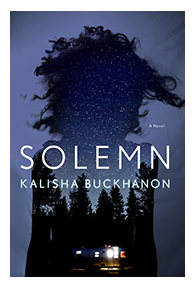Kalisha Buckhanon is the author of Solemn (St. Martin’s Press, 2016). (Photography by DeJohn Barnes)
Author Kalisha Buckhanon, AB’99, AM’07, discusses the power of storytelling, Trayvon Martin, and how professor William Veeder changed her life.
Author Kalisha Buckhanon’s (AB’99, AM’07) latest book, Solemn, completes a trilogy on black American youth that began with Upstate (St. Martin’s Griffin, 2005). She discussed the books and her influences, literary and otherwise, with the Magazine. Her responses have been edited and condensed.
Why did you choose to focus on the lives of young people in novels ostensibly for adults?
My first novel was my MFA thesis at the New School in New York City. I was teaching a lot and was around kids all the time. Their voices were immediate in my head in the middle of the night when I wrote. My thesis adviser was the novelist Sapphire, and she urged me to stop collecting my stories for a thesis but to continue on with what I called a “little thing” about two kids from Harlem writing letters. Once Sapphire took the pages to a friend who was an agent, they sold in an auction I still do not understand. I never thought anybody would read some love letters and notes between two black kids. The challenges African American adults face carry more emotional push for me considering their trickle-down effects on children, who have little choice in circumstances. Books for young people are often not complicated enough for me, but that does not bar me from writing complicated books about young people.
Upstate was published years before the spate of high-profile shootings of black youth that helped spark Black Lives Matter. Did this emerging national dialogue and newfound attention affect the plot and development of Solemn?
 I started Solemn when I was assisting at a preschool near campus. I came in one day shortly before my 35th birthday, and the talk was about some man in Florida who shot a black boy without being arrested for it. It was not anger, but disgust. I was arrested by Trayvon Martin’s loss because he reminded me of my little brother, who is in his mid-20s: same height, build; childish Facebook posts and interests. We all took it personally for our own reasons, and that was mine. I was scared, heartbroken. I watched his family handle that, and through it all I could see how closely they looked like me or my relatives. I am glad you pointed out these shootings were “high-profile,” because it has always been going on. Only it finally crested into international focus. Prior to this moment, all my books and writing had these concerns. I have tried to just be a “writer,” but I could not leave oppression out of the narratives because we can’t leave it out of our lives. It was only natural for me that Solemn would twist around this stuff. However, to see what I was trying to capture with Upstate 10 years ago play out in real life before my eyes made Solemn richer.
I started Solemn when I was assisting at a preschool near campus. I came in one day shortly before my 35th birthday, and the talk was about some man in Florida who shot a black boy without being arrested for it. It was not anger, but disgust. I was arrested by Trayvon Martin’s loss because he reminded me of my little brother, who is in his mid-20s: same height, build; childish Facebook posts and interests. We all took it personally for our own reasons, and that was mine. I was scared, heartbroken. I watched his family handle that, and through it all I could see how closely they looked like me or my relatives. I am glad you pointed out these shootings were “high-profile,” because it has always been going on. Only it finally crested into international focus. Prior to this moment, all my books and writing had these concerns. I have tried to just be a “writer,” but I could not leave oppression out of the narratives because we can’t leave it out of our lives. It was only natural for me that Solemn would twist around this stuff. However, to see what I was trying to capture with Upstate 10 years ago play out in real life before my eyes made Solemn richer.
What do you hope readers take away from Solemn?
I appreciate people for coming along with me deeply into a young, black, trailer-park girl’s psyche, mind, spirit, and soul. She’s not glamorous or famous. She wants to be. She does not have any juicy love affairs or girlfriend gossip to give. She’s a victim of them. She’s not scaling buildings. She wants to, like all kids with an imagination do. I had never read a novel about a young black girl living in a trailer park, and I wanted to. I want people to treat her like a character no one has ever thought too much about before, but should. She has a story. She was here. There are many more where Solemn’s came from.
What benefits does fiction have over nonfiction to address social issues?
Fiction can live. The stories can live well past the moment and teach people much later in the future what life was at a certain moment in time for certain people. Nonfiction, besides some of the most powerful treatises or legal decisions that changed the states of the world, or anointed essayists like [James] Baldwin and [Joan] Didion, is ephemeral. It moves with the times, and time moves very fast. So it must be much more aggressive in its address. Fiction can relax, because we have novels like The Bluest Eye and Their Eyes Were Watching God that leap through time. And more people will trust and enjoy fiction than will read my blogs or essays. People love people, even if they are imaginary. And we will love people even when those people are showing us society’s ills or flaws in man. If I said the things I was really thinking when I wrote the fiction, no one would listen. But I just stood and read from Solemn for the first time at a salon in Brooklyn where I was the only black person there, and I read sentences about the nosy white people and the rich white boys who get off for everything. This was no essay, but characters in their own world and a narrator sharing their thoughts on it. And it was relaxed and trusted. I was not an angry black woman. That’s fiction.
Who are some of your literary inspirations?
I have too many favorite writers. I find new inspirations all the time. Not all of them are novelists. I was recently blown away by Elizabeth Kolbert’s The Sixth Extinction (Henry Holt and Company, 2014) and Sonali Deraniyagala’s memoir Wave (Vintage, 2013). I just read a few mysteries from my fellow Sisters in Crime, a business league of women suspense writers founded by Sara Paretsky, AM’69, MBA’77, PhD’77.
How did UChicago influence you and your writing?
I would not be a writer without the University of Chicago. I would not have had the courage or belief. I was given my number one favorite book ever of all times, Sula by Toni Morrison, in a Fiction of Three Americas class taught by William Veeder when I was a junior. That book was the tipping point for me to say I could throw together the craziness and idiosyncrasies of people as I knew them into a book. The College was the most powerful experience and time of my life. I do not know too many places, even historically black colleges, where a little bookworm from Kankakee, Illinois, can wind up hosting or shaking hands with the likes of Octavia Butler, Angela Davis, Gwendolyn Brooks, Sonia Sanchez, Toni Morrison, Elizabeth Alexander, Derek Walcott, and John Edgar Wideman while dreaming of being a writer herself. That’s miraculous. The downside of being a U of C grad is my expectations of books are very, very high. I know their worth. I work long and hard, too long and hard I think, out of worry to measure up.
What are you working on now?
I am pruning and decorating a new novel I finished this past winter, Speaking of Summer. I have a play I first began 10 years ago at Chicago’s South Side eta Creative Arts Foundation’s playwriting workshop: Conjugal Visits. I am just now returning to it full force. I have a short story series on Amazon Kindle Singles, about a mixed-race couple in Hyde Park who want to adopt a black child. It is called “Pick Me.” I want to start another novel that’s been in my head for a while called “Choke Chains.” Oxford American will publish some of it as flash fiction in its June issue.
 I started Solemn when I was assisting at a preschool near campus. I came in one day shortly before my 35th birthday, and the talk was about some man in Florida who shot a black boy without being arrested for it. It was not anger, but disgust. I was arrested by Trayvon Martin’s loss because he reminded me of my little brother, who is in his mid-20s: same height, build; childish Facebook posts and interests. We all took it personally for our own reasons, and that was mine. I was scared, heartbroken. I watched his family handle that, and through it all I could see how closely they looked like me or my relatives. I am glad you pointed out these shootings were “high-profile,” because it has always been going on. Only it finally crested into international focus. Prior to this moment, all my books and writing had these concerns. I have tried to just be a “writer,” but I could not leave oppression out of the narratives because we can’t leave it out of our lives. It was only natural for me that Solemn would twist around this stuff. However, to see what I was trying to capture with Upstate 10 years ago play out in real life before my eyes made Solemn richer.
I started Solemn when I was assisting at a preschool near campus. I came in one day shortly before my 35th birthday, and the talk was about some man in Florida who shot a black boy without being arrested for it. It was not anger, but disgust. I was arrested by Trayvon Martin’s loss because he reminded me of my little brother, who is in his mid-20s: same height, build; childish Facebook posts and interests. We all took it personally for our own reasons, and that was mine. I was scared, heartbroken. I watched his family handle that, and through it all I could see how closely they looked like me or my relatives. I am glad you pointed out these shootings were “high-profile,” because it has always been going on. Only it finally crested into international focus. Prior to this moment, all my books and writing had these concerns. I have tried to just be a “writer,” but I could not leave oppression out of the narratives because we can’t leave it out of our lives. It was only natural for me that Solemn would twist around this stuff. However, to see what I was trying to capture with Upstate 10 years ago play out in real life before my eyes made Solemn richer.
